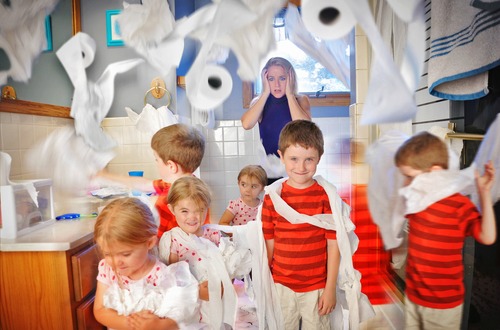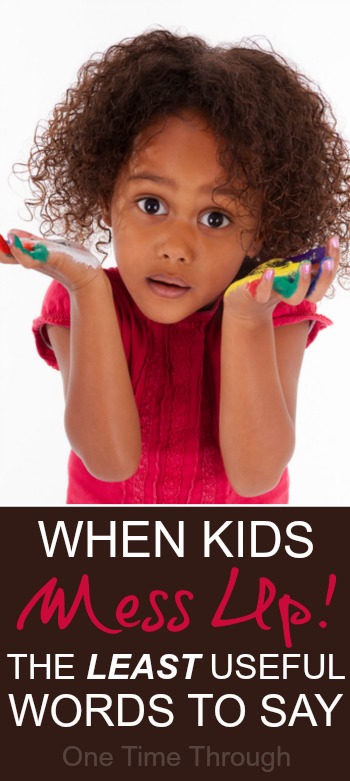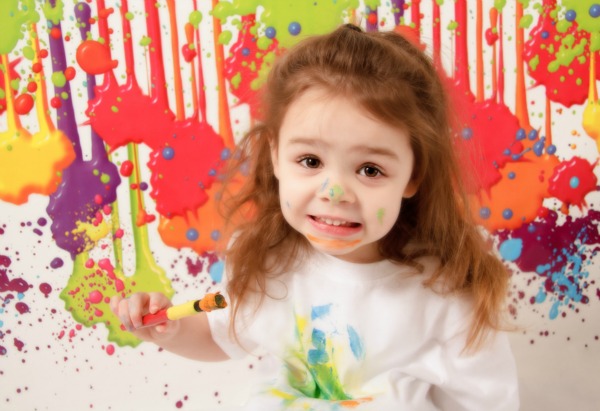“I didn’t do it” “It wasn’t me!” “I don’t know why I did it!”
If you are a teacher or parent, and you’ve heard these comments from your kids or students, you’ve probably used the words that I’m writing about today. I have used them many times over the years, and even after becoming aware of their negative impact, they still slip out of my lips sometimes…old habits die hard I guess.
Even when said in a caring, non-accusational way, if they are used after our kids mess up or “misbehave”, we are sending negative messages to them that are counter productive, and probably unintentional.
So what are they? And why are they some of the least useful words you can say when kids mess up? Read on to find out what positive parenting experts have to say!
Amazon Affiliate links are included in this post. See Disclosure for more details.
“WHY did you DO that?”
That’s it – I told you that you had probably used these words before!
For me, the words usually want to pop out after a child is aggressive with another child, or when my son does something that is annoying or destructive, like squirting toothpaste all over the sink and bathroom countertop…grrrr.
And I usually ask this question because I’m truly and genuinely wondering what the heck the child was thinking, so that I can help to make the problem better (or at least to prevent it from happening again.)
But, I’ve recently changed my mind about the usefulness of these 5 words – and I’ve been really trying hard not to let them pop out. Maybe you’ll change your mind too after reading these 3 reasons from some of my favourite parenting experts.
3 Reasons to Avoid Asking the “Why” Question
1. It Places Blame
According to Marshall B. Rosenberg, author of Nonviolent Communication: A Language of Life: Life-Changing Tools for Healthy Relationships, when we ask our kids to explain why they made the poor choices they made, it immediately puts them into a defensive stance.
Suddenly the only choices to respond become to deflect blame (“It wasn’t me!” or “He made me do it!”) and/or justify themselves, OR get ready to attack (“Leave me alone!” “You’re always blaming me!” “You never understand!”) Sound familiar?
In a nutshell, the chances of your child answering in a way that accepts responsibility for him/herself become very low. And if you’re just trying to understand the child’s motivation – you’re not going to get an answer to that question anyway. (At least, I never do!)
2. Kids Don’t Always Know WHY They Behave in Certain Ways
Parent: “Why did you do that?”
Child: “I don’t know!”
Parent: “You must know. What were you thinking?”
Child: “I wasn’t thinking anything. I just did it.”

I know this for a fact without the help of parenting experts, because I was THAT kid myself. I clearly remember a time when I was in grade 2 and I was allowed to stay in for recess by myself to finish an art project.
When my class returned from break, there were angry and upset cries from almost everyone because a small corner had been torn off of everyone’s art….everyone’s art except mine….(not too smart huh?)
My teacher knew it was me right away, and we had a chat in the hallway that I will never forget. Mr. Smith didn’t get angry, and he didn’t ask me why I did what I did. He just talked to me about how the other kids were feeling, and asked how I was feeling about that.
He didn’t yell, and he didn’t punish me. But I did come away from that conversation with a thorough understanding of the social consequences of my actions, and a deep respect for him.
In any case, even to this day, if you asked me WHY I tore those pages – I can’t really tell you. I can only guess. Maybe I was feeling jealous, or angry, or wanted attention. I have NO idea – and yet I clearly remember walking around the room tearing those corners of art off.
My point is – it was an impulsive behaviour with no conscious thought behind it. If someone had asked me WHY I had done it – I genuinely couldn’t have told them why.
According to parenting expert Alyson Schaefer, most of the time kids “misbehave” because it works to get them what they need at that moment – and those needs are usually for attention or power.
To read more about how to easily tell what need your kids are trying to fill – read this post.
3. It Doesn’t Focus on Solving the Problem or on Making Amends
I think it’s really important that we ask ourselves as parents and teachers, exactly WHAT we want our kids to feel, think, and do – after they make poor choices.
All of my favourite positive parenting experts: Barbara Coloroso, Alyson Schaefer, Adele Faber and Elaine Mazlish, and Alfie Kohn emphasize that it’s not enough to just get our kids to say sorry or to experience negative consequences for their actions.
Ideally, we want our kids to take responsibility for their actions and to learn from their mistakes and poor choices.
Personally, I want my son to feel responsible for the poor choices he makes, and yet not feel degraded or humiliated.
I want him to think about the effects of his poor choices – how his actions have negatively affected either himself or others. I also want him to think about how he would do things differently the next time.
And, I want him to do the best he can to make the situation better. Maybe that means making amends with someone he has hurt, or maybe that means cleaning up a mess he has made. Whatever the poor choice was – if he can do something about it – I want him to willingly do these things – without needing to be coerced by me.
Helpful Things to Say When Kids Mess Up
So – instead of asking “Why did you do that?” – I’m trying these three strategies. Sometimes I use just one, sometimes I use all three. It just depends on the situation.
1. Describe the PROBLEM
“We’ve got a problem here. I see a big mess on the floor. There are crayons left out, paint spilled, and the garbage is overflowing.”
“This is a problem. It doesn’t matter who did it. How can you all help make this better?”
When I emphasize that there is a problem to be fixed, without placing blame, my son, Onetime, usually jumps to help make things better immediately.
Most of my students respond favourably to this type of description also because it doesn’t center anyone out and it gives them information about what needs to be done.
2. Empathize with the child’s/children’s FEELINGS
“You both look really upset right now. Let’s talk about what happened.”
“I can see that you’re really frustrated and angry. That’s okay…. I expect you to use your words when you’re upset though, and not your hands. How can you make this better?”
I usually start with this one when it’s clear that there are strong feelings involved. Kids need to feel understood before they will see things from an adult’s point of view.
By empathizing with their feelings from the start, I always find kids are more cooperative and able to take responsibility for their actions and mistakes.
3. Express MY feelings and needs without blame
“I’m really upset right now because I get frustrated when I’m left to clean up a mess I didn’t make. I would like this room to be tidy when you’re done playing with your toys.”
“I’m really disappointed that the garbage didn’t get taken out. I need to know that this chore will be done so that our garage doesn’t get smelly. How can you make sure that happens from now on?”
When expressing my feelings, I’ve been working really hard on starting my sentences with how I’m feeling and what I need, without using the word “you.”
It’s an awesome strategy that I learned from reading the book Nonviolent Communication, and I find it really works…with my son, my students, and even my husband! It just takes a LOT of practise if you’re used to using blaming language, and it requires you to allow yourself to be a bit vulnerable. But sometimes, vulnerability and openness with kids can be a strength.
Looking for even more positive parenting posts? Be sure to check out my Positive Parenting homepage or my Character Series.
Remember to follow me on Facebook and Twitter!
I love hearing your thoughts and ideas! Leave a comment below and tell me how you try to react when your kids or students mess up!
Best,


